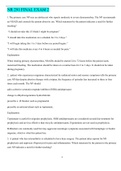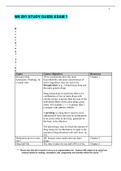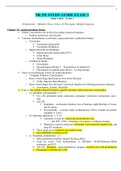NR 291
South University
All 3 results
Sort by

-
NR 291 FINAL EXAM 2| VERIFIED SOLUTION
- Exam (elaborations) • 10 pages • 2023
-
- $11.00
- + learn more
NR 291 FINAL EXAM 2The primary care NP sees an adolescent who reports moderate to severe dysmenorrhea. The NP recommends an NSAID and counsels the patient about its use. Which statement by the patient indicates a need for further teaching? “I should not take this if I think I might be pregnant.” “I should take this medication on a schedule for 2 to 3 days.” “I will begin taking this 1 to 3 days before my period begins.” “I will take this medicine every 4 to 6 hours as neede...

-
NR 291 STUDY GUIDE EXAM 1
- Exam (elaborations) • 12 pages • 2023
-
- $11.00
- + learn more
NR 291 STUDY GUIDE EXAM 1Recording 1:35:00 Topics Course Objectives Resources Bioequivalent, Synergistic, Prodrugs, In a steady state If two medications have the same bioavailability and same concentration of active ingredient, they are said to be bioequivalent (e.g., a brand-name drug and the same generic drug). Drug interactions in which the effect of a combination of two or more drugs with similar actions is greater than the sum of the individual effects of the same drugs given alone. F...

-
NR 291 STUDY GUIDE EXAM 3
- Exam (elaborations) • 11 pages • 2023
-
- $11.00
- + learn more
NR 291 STUDY GUIDE EXAM 360 Questions – Multiple Choice, Select All That Apply, Multiple Sequence Chapter 25: Antidysrhythmic Drugs • Which 3 electrolytes are involved in cardiac electrical impulses o Sodium, potassium, and calcium • Common dysrhythmias (ventricular, supraventricular, conduction blocks) o Ventricular Ventricular tachycardia Ventricular fibrillation o Supraventricular dysrhythmias Supraventricular tachycardia (SVT) Atrial flutter Atrial ...

How did he do that? By selling his study resources on Stuvia. Try it yourself! Discover all about earning on Stuvia


